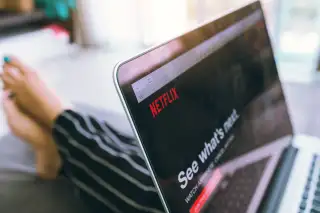Sharing Passwords on Netflix and Other Streaming Services Is About to Get More Difficult

How many people have your Netflix password? Is your Netflix password really yours, or are you still "sharing" your parent’s account, or maybe your old roommates? There are, after all, a lot of streaming services in the world. We’re not saying that you loaned out a password or having been using a friend of a friend’s...but you probably know someone who is stretching the rules for what's acceptable in terms of password sharing.
For a while, CEOs like Netflix’s Reed Hastings held the opinion that password sharing was just part of the business. HBO’s then-CEO Richard Plepler even called password sharing a “terrific marketing vehicle for the next generation of viewers.”
Lately, though, streaming services are starting to think that maybe sharing isn’t caring after all.
According to Bloomberg, Netflix, HBO and other “cable-industry titans” are “stepping up efforts to crack down on password sharing, discussing new measures to close a loophole that could be costing companies billions of dollars in lost revenue each year.” Park Associates estimates that password sharing costs pay TV services $6.6 billion in revenue this year.
In 2017, Netflix, Amazon, Walt Disney, Viacom, AT&T's HBO, Comcast, and Charter formed the Alliance for Creativity and Entertainment, which seeks to curb piracy. As The Hollywood Reporter noted, in 2017 the group brought lawsuits against against services like TickBox and Dragon Media that sold devices that pre-loaded with software that facilitated piracy. The alliance has recently turned its attention to password sharing.
How will Netflix and other streaming services crack down on rampant password sharing? The measures to curb the practice could possibly include making customers change their passwords “periodically” and texting codes to subscriber’s phones so they can continue watching. The utilization of identifying thumbprints, thus making the use of Netflix feel like signing into your iPhone, has also been floated.
One of the main problems is that it can be difficult to tell when a family is sharing a password, which is generally a-ok with Netflix and others, and when a moocher friend-of-a-friend is logging in. Another issue is that many younger consumers are unwilling to sign up for a subscription and would likely just go back to pirating content. Also, cable companies such as DirecTV and Comcast typically allow up to five people to stream from one account, while companies such as Hulu and Netflix allow multiple users, depending on the customer’s plan.
The Hollywood Reporter noted that streaming services are well aware that “even the scent of the criminalization of password-sharing has in the past caused a freak-out among consumers,” and as such they are aware they need to treat lightly. That said, these companies are also well aware that the Streaming Wars are officially underway, and there's enormous pressure for streaming services to become profitable as soon as possible.
Maintaining the balance between alienating customers and curbing password sharing is clearly going to be a tough needle for companies to thread in the coming years.